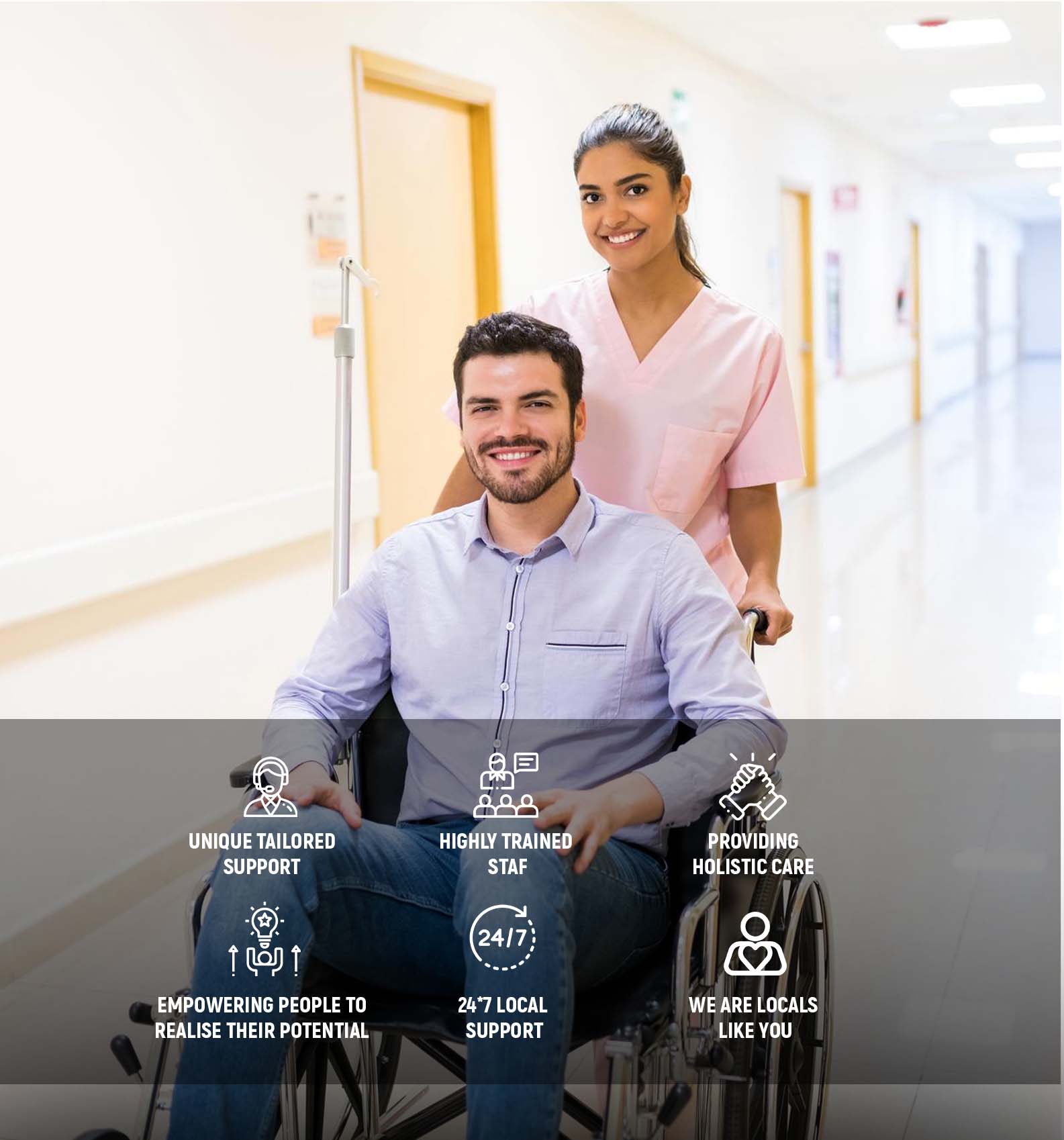Mental Health Perth
What is the definition of mental health?
Mental health can be defined by the emotional, psychological, and social aspects that envelope who we are, and how we see the world. It impacts how we think, feel, act and behave in situations. Furthermore, mental health can be seen with how we handle stress, relate to others, overcome obstacles, and make decisions in our lives. From childhood to adolescence and then through our adult years, looking after our mental health is crucial to a well-rounded life.

What are the pillars that impact our quality of mental health?
When identifying the pillars of good mental health, there are seven core components and behaviours that contribute to the quality of our mental health. They are as follows…
- Activity : Being active has always been crucial to survival. Humans are built for movement and mental engagement.
- Defence mechanisms : When we use defence mechanisms, we can counter negativity and favour positive choices.
- Social connection: Human beings are social beings. Our ability to connect indicates our ability to seek supportive interactions.
- Regulation : Emotion regulation is the ability to exert control over our own emotional state. This skill is crucial for maintaining healthy emotions, thoughts, and behaviour.
- Human specific cognition : Basic cognition largely consists of our “executive functions,” such as attention, organisation, planning and multitasking. Social cognition includes our capacity to interpret emotions in facial expressions, understand the intent of others and recognise one’s place in any given relationship.
- Self-acceptance : This is determined by our evaluation of our positive or negative value. Mental health concerns like anxiety and depression are directly correlated with a lack of self-esteem, and self-acceptance.
- Adaptability : Life changes every day. Our capacity to be malleable or lacking a sense of flexibility results in unfavourable outcomes contributing to mental illness.
What would be deemed as a mental health problem?
Mental health is an umbrella term that can group together a series of illnesses that impact an individual’s thoughts, perceptions, behaviours, emotions and feelings. It can also impact personal relationships.
When our pillars, as outlined above, are impacted, it can how negatively impact we think, feel and behave. Suddenly, coping with everyday life becomes a burden.
Thinking:
- Having strange and negative thoughts
- Lack of clarity in thoughts
- Finding it harder to make decisions
- Disorganised thought patterns
- Slow thinking or even, thinking too fast
- Thoughts zapping into our head are upsetting
- Having beliefs that do not match reality
Emotions:
- Rapidly changing emotions that you have no control over
- An overflow of emotions
- Feeling sad or down – more than usual
- Extreme anger and irritability
- Feeling more scared than usual
- A sense of feeling flat
Activity:
- Eating more or less
- Sleeping a lot more or a lot less
- Avoiding doing things, including things you usually like doing
- Being alone more
- Not taking care of yourself
- Not being able to stay still
- Doing the same thing over and over again
Here is a list of what constitutes mental health disorders, that come as a result of problems:
- Anxiety disorder
- Bipolar disorder
- Depression
- Dissociative personality disorder
- Eating disorders
- Paranoia
- Obsessive compulsive disorder
- Psychosis
- Schizophrenia
- Behavioural and emotional disorders in children
Why should every person care about their mental health?
There are countless reasons why you should care about your mental health and well-being. Our team at Compass Care Group have created a list of benefits for you to consider…
- Positive mental health will improve your concentration
- Positive mental health can improve your day-to-day life
- Positive mental health can help you develop meaningful connections within the community
- Positive mental health can help you establish strong, lifelong interpersonal connections
- Positive mental health will reduce your anxiety
- Positive mental health will improve your general mood
- Positive mental health will provide you with a sense of calm, inner peace and clarity in your thoughts
- Positive mental health will lead to more fulfilling choices in personal and professional life


What is psychosocial disability?
At a glance, psychosocial disability is the impact that results from the social consequences of disability. It can also be the functional impact and barriers which may be faced by someone living with a mental health condition.
Those impacted by psychosocial disability face challenges setting goals, engaging with learning, participating in social situations, immersing in cultural activities, and engaging in meaningful employment.
Psychosocial disability may restrict a person’s ability to:
- Concentrate
- Be in certain types of environments
- Have enough endurance to complete tasks
- Cope with multiple tasks
- Interact with others in social or work settings
- Comprehend and digest constructive feedback
- Manage and regulate stress
If you live with a psychosocial disability, you may require support to overcome the barriers to feeling included in social scenarios. If this is something you are struggling with, then our team at Compass Care Group are here to support you. Our NDIS disability service professionals are here for you.
What is the difference between mental health and psychosocial disabilities?
While mental health describes a wide range of mental and emotional conditions, psychosocial disabilities can arise from a poor management of one’s mental health, and severely impact a person’s ability to recover, navigate life and perform day-to-day functions. You can be considered to have a psychosocial disability if your condition significantly impacts your ability to participate in the community, form meaningful connections and completing your daily activities.
What is psychosocial recovery coaching?
Psychosocial recovery coaching is a new program that can be funded by the NDIS. It offers support to people living with psychical disabilities. Coaches have expertise in helping their clients navigate throughout all areas of life, including mental health and social navigation skills necessary for full participation within society at large.
The purpose behind this initiative was twofold: firstly, it strives towards providing assistive care where needed most; secondly its hope lies within building resilience against major depressive disorders or other similar illnesses through personalised attention tailored specifically around an individual’s needs.
How can the NDIS help with psychosocial disabilities?
To be eligible for NDIS, a participant will need to prove the permanency of their disability, and outline the necessity of specific funding. Some people with prolonged but not permanent disabilities may be unable to access the NDIS because they do not meet these requirements.
If the NDIS is satisfied that you…
- Have a disability that is likely to be permanent (including psychosocial disability)
- Need support because you have substantially reduced capacity to take part in the activities of daily living and to effectively participate in society
- Require support from the NDIS over their lifetime
Then you can get funding to support overcoming psychosocial disabilities. Speak to the team at Compass Care Group today, we can advise you on how to apply for NDIS funding for your psychosocial disability.
What our psychosocial recovery coaches can do for you:
- We design, develop and plan recovery-enabling relationship, through implementation of a thorough recovery plan
- We coach and support you to increase recovery skills and personal capacity. We do this by motivating, highlighting strengths, resilience building and advocating positive decision-making
- We have a clear roadmap, so you can celebrate your progress, and milestones achieved
- We liaise with the NDIS and other supports on your behalf – giving you peace of mind
- Together, we establish a solid framework to manage complex challenges of day-to-day living
- You retain choice with how you receive your services – whether that be face-to-face or online


How can Compass Care Group help you to overcome your psychosocial disability?
For people with psychosocial disability, not having the right supports to help them feel socially included and engaged in life can lead to becoming caught in a cycle of poor mental health.
But with the right supports and strong networks of caring friends and family members, a person with psychosocial disability can manage their condition and may also be able to focus on recovery.
- By being adaptable:Many psychosocial disabilities fluctuate and the person you care for could have different needs on different days.
- Good communication: By being open about your needs, we can make sure any changes are addressed immediately.
- Open conversations: We encourage an open platform for you to share how you feel, and what your needs are.
- Acting as your advocate: We are the team you can count on through treatment or health appointments, and with your conversations with the NDIS.
- We are your encouragement: We want to see you do things you couldn’t do, and we will be celebrating each and everyone of your wins – we are here to encourage you.
Why choose Compass Care Group as your psychosocial recovery coach?
Here are the reasons why participants choose us as their psychosocial recovery coach…
- Our psychosocial recovery coaches work alongside individuals to find ways to take more control of their lives
- We strategies innovative ways to tackle the complexity of daily life
- Our focus is on well-being, empowerment, and independence
- By clearly identifying individual goals and challenges, our team works with you, your family, carers and your wider support networks to build a recovery plan that’s adapted to what you need
- Our person-centred and highly ethical approach to psychosocial recovery coaching is all about empowering you to reach your goals and build a life by design
- We make plans to help grow resilience, build capacity and increase individual decision-making abilities

Are you ready to build your confidence, and achieve a sense of empowerment over your life?
Then chat to our team of NDIS registered disability support service professionals today. We are here to help you reach your goals for increased independence.
FAQ’s
Do I need to provide a mental health diagnosis to access the NDIS?
In terms of mental health, who is eligible for the NDIS?
Mental health isa broad term that refers to symptoms that may be caused by a range of factors. People living with a mental health condition must provide evidence that they have a mental health condition that causes an impairment that is lifelong.
Approximately, 10% of NDIS participants in Australia have a psychosocial disability, which is a disability caused by one’s poor mental health. Therefore, if you can prove you have a psychosocial disability, you will likely be eligible for the NDIS.
Apart from living with a psychosocial disability, you will need to be an Australian citizen, have a ‘concept of recovery’, can show need for psychosocial recovery coaches and between the age of 7 and 65 years.
It is imperative that you meet the outlined criteria and guidelines, providing evidence that:
- You have experienced difficulties navigating everyday life, directly due to your mental health condition.
- That as a result of your mental health related difficulties you will likely require NDIS support on an ongoing basis, over a long term, if not permanently.
- The difficulties you experiencea hve substantially reduced your ability to do everyday activities.
Please note, the NDIS is not designed to replace the healthcare system of Western Australia, nor does it override any community mental health services or treatment services. It exists and is designed to fund practical support for day-to-day living and assistance to access community service.
Is mental illness covered by the NDIS?
NDIS support can help you live a more fulfilling life with mental illness. Please note, this not funding for therapy but rather functional assistance in daily living such as getting to medical appointments, finding housing that suits your needs and taking medication properly – all things which will improve how we conduct our day-to-day lives.
Please note that the NDIS assessing your mental health as a whole, and witnesses how your mental health impacts you. After identifying whether or not you meet the criteria, support may be available to help address any issues you have.
You may be eligible for a plan with the NDIS, if you live with a psychosocial disability. If you need assistance to carry out everyday tasks involving communication, social interaction, learning, mobility, self-care and self-management, you could have options that you were unaware of.
To be considered eligible, you need prove that you experience difficulties in doing at least one of the below areas, without support or with reduced functional capacity. This is as dictated by the NDIS:
- Communication – being understood in spoken, written, or sign language, understanding others and the ability to express your needs.
- Social interaction – making and keeping friends, interacting with the community, behaving within limits accepted by others and the ability to cope with feelings and emotions in a social context.
- Learning – understanding and remembering information, learning new things, practising and using new skills.
- Mobility – your ability to move around the home and community to undertake ordinary activities of daily living requiring the use of limbs.
- Self-care – personal care, hygiene, grooming, feeding yourself and the ability to care for your own health care needs.
- Self-management – the cognitive capacity to organise one’s life, to plan and make decisions, and to take responsibility for yourself, completing daily tasks, making decisions, problem-solving and managing your finances.
Furthermore, you may be entitled to receiving NDIS support in these areas to help you perform tasks.
A few examples of how the NDIS can help include:
- The support and help you deserve to get out and about in your community, helping you build real life relationships with new friends.
- Support and assistance with shopping, preparing your meals and cooking.
- Encouragement, support and help around your house or garden.
- Enabling you to access your Centre link benefits.
- Helping you find a house that feels like a home with the right accommodation for you.
- Support coordination or psychosocial recovery coachingand assistance with the NDIS.
- Access to the relevant funding for therapies like a psychologist, counsellor, psychiatristand a social worker.
- The necessary transport to get to and from your medical and personal support appointments.
- Learning and developing skills to travel independently on public or private transport.
- You will gain support to develop your personal and professional goals.
- You will learn how to budget for and pay your bills.
- You will receive all the assistance needed to improve your self-care like hygiene, showering and grooming.
You will need to meet eligibility criteriain order to access the NDIS. We have outlined the eligibility criteria above. If you need further assistance, do not hesitate to contact us.
In the process, you will need to submit an Evidence of Psychosocial Disability form, which is to be completed by your most appropriate clinician, and your support worker. By completing this mandatory evidence form, it makes it simpler for those with a psychosocial disability and supporters to collect evidence for NDIS eligibility.
You will also need to submit a standard Access Request Form or make a Verbal Access Request by calling the National Disability Insurance Agency (NDIA), which runs the NDIS, on 1800 800 110.
What is the mental health system responsible for?
Alongside NDIS supports, a participant can continue to get support from their psychologist, psychiatrist, and occupational therapist funded by the mental health system.Other areas covered include services within public hospitals, access to emergency departments, residential mental health care and community mental health care services.
Here is what the mental health system in Australia is responsible for:
- Clinical acute mental health supports, whereby you access care in a hospital or similar setting.
- Mental health care where you don’t stay in hospital (clinical outpatient and continuing care).
- All the recovery aspects of your mental health, also known as clinical rehabilitation.
- The clinical early intervention mental health supports to help you grow and develop (being proactive rather than reactive).
- Mental health residential services.
If you require assistance with other issues or conditions you may have alongside a psychosocial disability, where the issue is clearly the responsibility of the mental health care system, you may be eligible for supports as supported and funded by Medicare. You will need to speak to your general clinician about this.
What supportive documents and evidence do I required to support my Access Request Form for psychosocial disabilities?
Before anything or anyone, you should consult your GP. They are your go-to point of contact regarding your mental health and mental health needs.
Your GP will also have the needed evidence that these services are imperative for you to live as independent a life as possible. So, please speak to them about getting your thoroughly detailed medical records and referrals to specialist supports.
To receive support from the NDIS, for those eligible, it is a requirement that you articulate your concerns of difficulty and indicate measurable goals. You should then outline how the NDIS can help you get there. It is important to establish your need within your application.
We also recommend getting help from a Local Area Coordinator (LAC). This is a good way to help you understand if you are eligible for the NDIS and how it can help you, as well as the process when applying and what happens once you receive an NDIS plan.
When you partner with an LAC, you can have peace of mind knowing they have experience in meeting with people with disability, identifying their goals, navigating the application process and handling the paperwork, which helps make the process easier and less stressful.
Tips for accessing NDIS psychosocial support
Your LAC can help you compile this evidence, which is a crucial step when it comes to applying for the NDIS. The National Disability Insurance Scheme (NDIS) was established in 2010 with an aim of providing support and funding so that people could live life on their own terms while still being able take care of themselves financially, if they needed assistance.
If you choose to create a written statement regarding your functional abilities and restrictions for the NDIA’s consideration, ask your family and friends to provide these comments from an outsider perspective. They can also comment on what they believe you need to live an independent and a more comfortable life.
How is mental health funded in Australia?
Although the NDIS does not fund the treatment of psychosocial disability, it does provide support to help you perform everyday tasks and live a fulfilling life.
Depending on which State and Territory you live in, the mental health system defers slightly, and funds supports in different areas that are clinical in nature. You can expect funding for supports on matters that encompass acute care, outpatient care, continuing care in the community, rehabilitation and recovery, clinical early intervention supports related to mental health and residential care for inpatient treatment or clinical rehabilitation.
The NDIS funds disability to support participants improve their functional ability to gain independence. The NDIS has the goal that you are able to undertake activities of daily living and participate in the community and social life.
Mental health services that happen to be funded by your State and Territory Government will be provided through community health facilities, public hospitals and will be delivered to your residence.Your GP can make a referral to specialist mental health services, or if you visit a hospital you can also be referred to these services as well.
For more information contact the Health Department in your State or Territory:
- South Australia – SA Health (08) 8226 6000 sa.gov.au
- Victoria – Department of Health and Human Services 1300 650 172 vic.gov.au/mental-health
- New South Wales – NSW Health (02) 9391 9000 nsw.gov.au/mentalhealth
- Tasmania – Department of Health and Human Services 1800 332 388 tas.gov.au/mentalhealth
- Western Australia – Department of Health (08) 9222 4222 wa.gov.au
- Queensland – Queensland Government 1300 642 255 gov.au/health/mental-health
- Northern Territory – Northern Territory Government 1800 682 288 gov.au/wellbeing/mental-health
The mental health system is generally responsible for clinical services such as diagnosis and treatments. If you live with a psychosocial disability, you may require regular or ongoing mental health supports.
The mental health system includes:
- Any and all government mental health departments, agencies,services and facilities.
- Public hospitals andpatient care provided within private hospitals.
- Inpatient mental health facilities, and other residential care.
- Access to specialist doctors, psychiatrists, psychologists and mental health care professionals.
- You are entitled to access community mental health care services.
